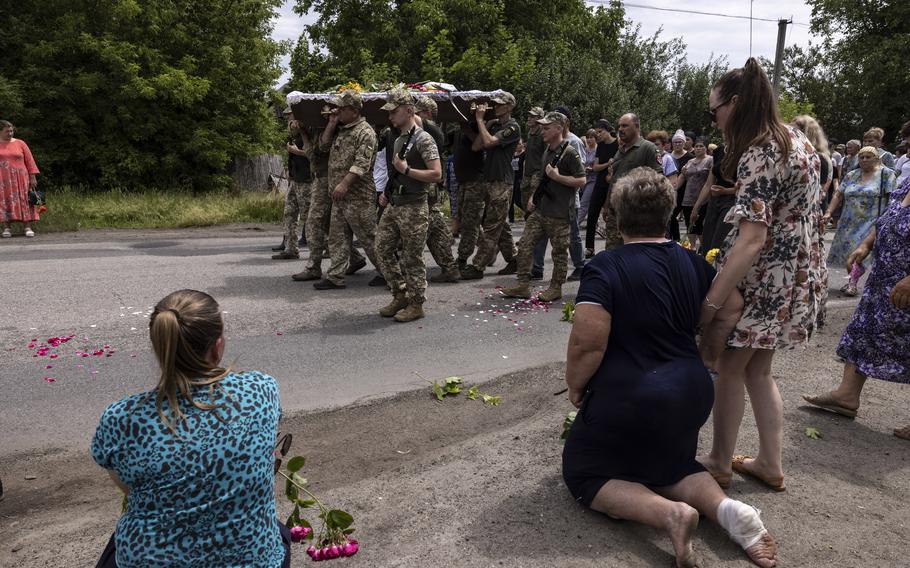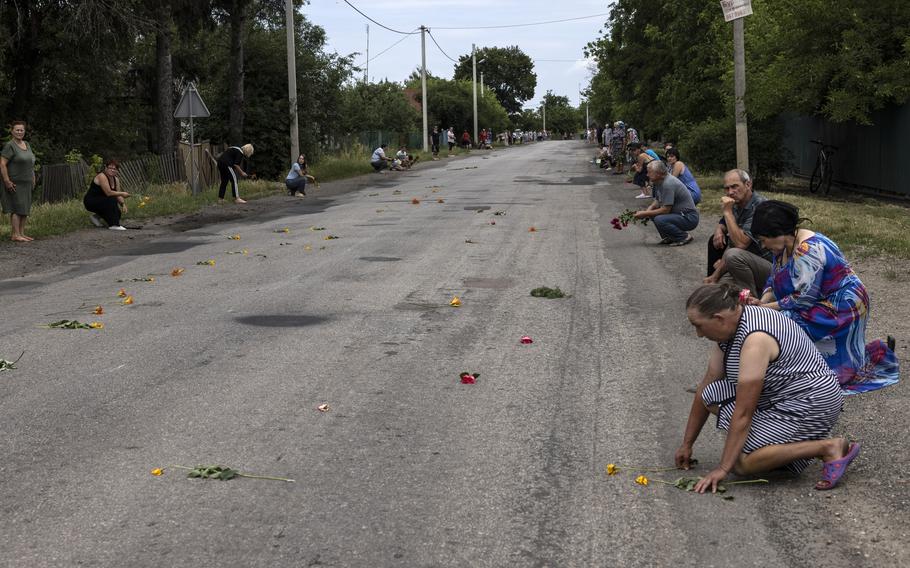Europe
A Ukrainian village’s final farewell to soldier highlights toll of war
The Washington Post July 29, 2023

Mourners kneel as Ukrainian soldiers carry the coffin of Ukrainian soldier Oleksandr Babych in Krasnosillia, Ukraine, during his funeral on June 24, 2023. (Heidi Levine/The Washington Post)
KRASNOSILLIA, Ukraine — Villagers lined the road from one end of the small settlement to the other.
At last, the coffin arrived. A boxy white van pulled to the side of the road, bearing the remains of Oleksandr Babych, a soldier who had been killed by a Russian attack on a military base soon after the launch of Ukraine’s long-awaited counteroffensive.
People who had been waiting at least half an hour on the road went down on one knee — even elderly babushki, who sometimes needed help back up. Several tossed flowers onto the pavement. Some made the sign of the cross.
Svitlana Budun, who serves as starosta, or elected leader, of this village, said the military funeral was the village’s second since the February 2022 invasion. Both occurred within about four months of each other.
Though Babych, 44, lived in another village close by, his remains would be buried here, near those of his father, Volodymyr, who died of natural causes last year, Budun said. Budun said she knew few details about Babych’s death, because official secrecy often surrounds Ukrainian military casualties and attacks on military targets.
The homespun, solemn ritual that unfolded here late last month was like many happening daily across Ukraine since Russian President Vladimir Putin launched a full-scale war nearly 1 1/2 years ago.
An estimate released by the White House in May says Ukraine and Russia have suffered a combined 380,000 casualties. Russian military casualties total perhaps 200,000, including 40,000 killed. Ukraine has suffered upward of 125,000 casualties, with at least 15,000 killed, the assessment found.
Mourners unloaded several floral arrangements from the van and removed the polished wooden coffin. A loaf of bread, a traditional symbol of life in Ukraine, lay on top.
A police car led the way. Next came a man carrying a large wooden cross, followed by dozens of mourners dressed as they might dress on any other weekday.

Mourners hold flowers and kneel await for the arrival of the coffin of Ukrainian soldier Oleksandr Babych in Krasnosillia, Ukraine, during his funeral on June 24, 2023. (Heidi Levine/The Washington Post)
Traffic stopped in both directions as a group of women unfurled a giant Ukrainian flag, its colors an emblem of the sky and ripening fields of grain around them. Children scattered rose petals. A small honor guard of soldiers, in mismatched uniforms and dusty boots, shouldered their weapons, and the funeral procession began.
“He was a family man, a good person,” fellow villager Mykola Fedorov, 52, said of the younger Babych.
“A very respectable man,” another mourner chimed in while passing by.
Babych’s mother cried out.
“Don’t leave me alone! My son! My brave one!” Valentyna Babych wailed, walking arm in arm with another mourner. “How am I going to live?”
As village elder, Budun gave a brief graveside eulogy, her voice so faint it was lost on the breeze. The priest chanted and prayed, and all waited in silence as Valentyna, embracing her son’s open coffin and kissing him, bid a last farewell. His face appeared to have been peppered by shrapnel.
Two men stepped in to fasten the coffin lid, tightening the heavy screws until they squeaked. Then the honor guard fired a rifle volley in salute, and several mourners flinched.
After the priest sprinkled holy water over the coffin, which had been lowered into the ground, he shoveled in a spray of dirt. Other mourners followed, sometimes grabbing fistfuls with their hands.
And then several women, including Budun, called out to the priest. “Look up!” they cried, pointing at the sky: a stork wheeled overhead in graceful circles — one of Ukraine’s national symbols, a figure associated with spiritual rebirth.
“It’s like a sign of farewell,” Budun said afterward. “His soul is already there.”
The Washington Post’s Anastacia Galouchka and Heidi Levine contributed to this report.